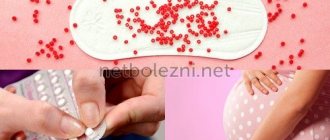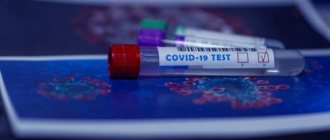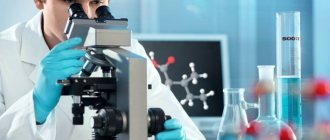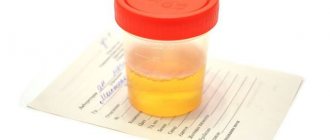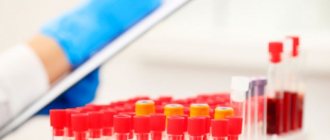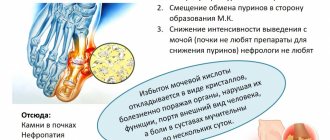Blood test total protein
Proteins are a substance that predominates in the composition of the dense residue of blood serum. They are the main building material of all cells and tissues in the body. Proteins also make up enzymes, hormones, antibodies, and blood clotting factors. Proteins are also responsible for transporting hormones, vitamins and minerals, fat-like substances, as well as other metabolic components in the blood. Another important role of proteins is the transport of all of these substances into cells. The amount of proteins in the blood serum directly affects the osmotic pressure of the blood, which is responsible for the balance between the water content in the body tissues and inside the vascular bed. Osmotic pressure is also responsible for maintaining tissue elasticity. Proteins play a key role in ensuring acid-base balance in the body. Proteins are also the main source of energy during malnutrition or starvation.
Serum proteins are of two types: albumins and globulins. The former are synthesized by the liver from incoming food. Albumin concentration affects the level of osmotic pressure. Globulins are the basis of immunity, ensuring normal blood clotting. Globulins are also contained in enzymes, hormones, and carrier proteins of various biochemical compounds.
Several physiological conditions of a non-pathological nature, as well as a number of diseases, can cause changes in protein levels in the blood. There are two types of deviation in blood protein levels: relative and absolute.
Explanation of the analysis for Total protein
Determination of total protein in blood serum is used to diagnose diseases of the liver, kidneys, cancer, and nutritional disorders.
The normal level of total blood protein is 64–83 g/l.
Increased protein content occurs in acute and chronic infectious diseases, cancer pathology, blood diseases, and dehydration. A decrease in protein levels is most often caused by diseases of the liver, kidneys, intestines, starvation and some others.
Causes of protein deficiency
- Impaired liver synthetic function
- the central metabolic factory. It is here that blood plasma proteins are formed: albumins and most globulins, which largely mediate the maintenance of homeostasis in the body.
This is accomplished by forming oncotic pressure: protein molecules, due to their chemical nature, attract water, thus exercising control over water-salt metabolism. An important consequence can be drawn from this: when the concentration of proteins in the blood serum is low or when they increase in the intercellular fluid and tissues, which is especially characteristic of inflammatory processes accompanied by increased vascular permeability, edema develops - water goes beyond the arteries and veins.
In diseases manifested by damage to hepatocytes (toxic or infectious agents), edema also occurs - and mainly on the lower half of the body and limbs. We wrote about this in more detail in this article:
- Nutritional factors
- fasting, generally leading to protein-energy deficiency, or an unbalanced and uncompensated plant diet with nutraceuticals, accompanied by a lack of essential amino acids in the diet - that substrate for the construction of cells and tissues that the body cannot reproduce on its own, from available elements and with the help of those present enzymes.
Below we have provided a small table with essential amino acids and the foods in which they are concentrated. We hope that this will help you competently organize and choose the type of nutrition that suits you.
| Valin | Isoleucine | Leucine | Lysine |
| eggs | soybeans | peas | chum salmon |
| milk products | peanut | perch | lentils |
| beef | egg yolk | turkey | chicken and turkey |
| lentils | pink salmon | milk | mutton |
| Methionine | Threonine | Tryptophan | Phenylalanine |
| eggs | sunflower seeds | turkey | beans |
| meat | pollock | squid | almond |
| milk and dairy products | zander | milk | cashew |
| mackerel | sesame | pistachios | cod |
- One of the most common pathologies that leads to difficulty absorbing protein from food is reduced acidity of gastric juice.
Hydrochloric acid produced by the parietal cells of the mucosa activates proteolytic enzymes and, in addition, promotes the swelling of protein molecules, facilitating enzymatic processing of food. It is also a powerful nonspecific protection factor that has a strong bactericidal effect - in particular, against protozoa, parasitic worms, bacteria and viruses.
The widespread popularity of self-administration and frequent prescription of proton pump inhibitors (“Omez”) has become a cause of serious concern among scientists about the likely consequences of their long-term use not only on the organs of the gastrointestinal tract, but on the body as such.
In addition to the effects of medications, disruptions in the folate cycle
(or rather, in the three main genes that regulate it: MTHFR, MTR, MTRR), since it is this that ensures the formation of the main mediator of the parasympathetic system - acetylcholine, which also stimulates the parietal cells of the stomach. When a mutation is detected, additional support for the body is necessary, aimed at reducing the concentration of homocysteine that accumulates in such conditions - an amino acid known for its damaging effect on the endothelium (the inner lining of the vessel) and plays an important role in the pathogenesis of atherosclerotic damage.
We recommend
“Vitamin D: top 30 foods with its high content” Read more
On the other hand, along with insufficient formation of acetylcholine, there is an increase in the inflammatory mediator - histamine. This occurs due to a disruption in the processes of its neutralization, normally carried out by methylation reactions. Considering that histamine is also an activator of gastric juice secretion, we can draw a logical conclusion: the effect of the folate cycle on the digestive system is somewhat ambiguous. It is logical to assume that under conditions of excessive intake of this biogenic amine, not only erosive lesions of the gastric mucosa develop, but also, due to increased permeability of the intestinal wall, structural elements of bacteria enter the systemic bloodstream - an inflammatory process is observed, and not limited to the gastrointestinal tract.
Another possible cause of hypochlorhydria is atrophic gastritis
- an autoimmune disease, accompanied by a decrease in the number of functioning cells due to their death during the “attacks” of antibodies from an immune system gone crazy, which ceases to clearly distinguish between what is “ours” and what is “foreign”.
- Damage to the gastric mucosa
: ulcers, gastritis, erosion. Despite the widespread belief in people’s minds that inflammation of the epithelial lining is purely caused by H. pylori, this cannot be compared with one hundred percent truth.
Firstly, infection occurs in early childhood, so the very concept of infection in adolescence or adulthood is more likely an ephemeral rarity than a truth as such.
Secondly, everything depends on the strain of the bacterium: not all of them are aggressive (or at least so strongly pathogenic that clinical manifestation and inflammation of the gastric mucosa itself appear) - and this entails mandatory diagnosis (at least before prescribing 2 weeks of antibiotic therapy). Considering the widespread distribution of the latter, which has already led to total resistance of the microflora (inhabiting both the distal parts of the small and large intestines of humans) to chemicals, as well as the bacterial past of mitochondria, our small power plants, selflessly producing energy, the decision to eradicate Helicobacter It should be well thought out by the doctor or nutritionist that resorting to more gentle therapy with nutraceuticals.
Helicobacter actually adapts (unlike most microorganisms) to the unfavorable conditions of the gastric environment: having a specific enzyme that breaks down urea, it alkalizes its habitat by releasing ammonia. However, pathology develops only when it disseminates - spreads from the pyloric region bordering the duodenum along the entire perimeter of the stomach.
Stress often leads to damage to the gastric mucosa
: it is accompanied by activation of the sympathetic nervous system with the subsequent release of adrenal medulla hormones into the blood, which, in turn, affecting the secretory apparatus of the kidneys, stimulate their release of a vasoconstrictor. It is the narrowing of the lumen of blood vessels, including those that supply blood to the stomach, that leads to subsequent ulceration of the mucous membrane.
- Impaired breakdown and absorption of proteins in the intestine.
The first is characteristic of exocrine pancreatic insufficiency, in which its secretory cells cease to form and release a sufficient amount of enzymes into the blood (and not only proteolytic ones). The second accompanies malabsorption syndrome and celiac disease - another autoimmune disease that, unfortunately, has ceased to be such a rarity today.
- Violation of bile formation and bile outflow,
which leads to the impossibility of not only the emulsification of fats, but also the activation of pancreatic enzymes. Helminthic infestation, blockage of the biliary tract by stones, decreased fluidity of this secretion due to the predominance of cholesterol over other components (bile acids and phospholipids) - a large number of possible causes necessitate careful laboratory and instrumental diagnostics, which build the missing puzzles in the clinical picture of the disease.
- Kidney diseases:
Normally, protein molecules are not filtered into primary urine due to their bulky size. However, if the renal filter is damaged (the formation of “holes” in it), massive proteinuria is observed, as evidenced by the detection of proteins in a general urine test.
Total protein analysis
Total protein in the blood is the main indicator on which to focus when assessing amino acid metabolism in the human body. This analysis is never prescribed separately - it is always carried out in conjunction with other studies. Assessing the level of total protein in the blood is necessary for diagnosing a number of diseases: pathologies of the kidneys, liver, oncology, and various infections. This analysis is also prescribed to monitor the effectiveness of ongoing therapeutic measures. In order to conduct a quantitative analysis to determine total protein, a sample of the patient’s biological material is required - venous blood plasma. Normal levels of protein in the blood are from 65 to 85 g/l. The research will take no more than 1 day.
Total blood protein is a general indicator of the concentration of all organic proteins that circulate in the blood plasma. The main substances isolated during the study are albumins and globulins. Albumin is a substance produced by the liver. Its concentration is about 60% of the total amount of proteins present in the human body. Globulins are a substance that is formed in the liver, lymphocytes and plasma cells. The concentration of this protein is not a constant indicator, which depends on the rate of its production from amino acids. In turn, this speed is influenced by a number of factors.
If the body produces excessive amounts of protein, it is not retained in the body. Passing a long way through the entire body, the substance eventually ends up in the kidneys and is converted into uric acid, which leaves the body in urine and feces.
The main task of blood serum proteins is to organize correct homeostasis in the body. Protein is involved in almost all biochemical processes of the human body. Plasma proteins are responsible for maintaining the normal state of the blood. They directly affect the degree of blood fluidity. In addition, proteins perform a transport function - they carry various substances to human tissues and organs: lipids, pigments, hormones, fragments of drugs.
Proteins are also responsible for the correct functioning of the human immune system. The production of antibodies, immunoglobulins and other protective cells of the body directly depends on their concentration in the blood.
Assessing the level of total protein is one of the stages of complex biochemical screening. Using the results of this analysis, surgeons and resuscitators evaluate the effectiveness of intensive care for critically ill patients, and also monitor patients after various surgical interventions. Also, the results of this analysis are necessary in cardiology and nephrology. Using the data obtained, doctors can determine the cause of edema, as well as impaired renal excretory function.
Call us
+7
Increased total protein: what does it mean?
This situation is rare, and yet it does occur. The first reason for this condition may be dehydration, but this problem is quite easy to deal with. The second reason is more serious – blood cancer. In this case, lymphocytes overproduce an abnormal amount of immunoglobulin, which no longer has a useful function, but quantitatively affects the value of the total protein.
Get tested for total blood protein in Moscow at the Meditsina clinic
A blood test for total protein is used to diagnose a huge number of diseases of almost all organs and systems. You can donate it at the Meditsina clinic, located in the Moscow ZAO area. We have our own laboratory, where a wide variety of analyzes of biological material are carried out using modern equipment.
In addition, our clinic employs qualified doctors who correctly interpret test results and prescribe effective treatment if necessary.
Here you will also find affordable prices for medical services - check out the price list to find out how much a particular test costs. You can make an appointment with a doctor, as well as tests, by phone or online.
Tests for coronavirus
- Test for coronavirus
- Coronavirus test for organizations
- Testing for coronavirus at home
- Testing for coronavirus at home in 12 hours!
- Testing for coronavirus in Lyubertsy in 12 hours!
- Testing for coronavirus in Nekrasovka in 12 hours!
- Testing for coronavirus in Korolev in 12 hours!
- Test for coronavirus on the Sokol metro station
- Coronavirus test at Kolomenskaya metro station
- Coronavirus test at Voykovskaya metro station
- Test for coronavirus in Nekrasovka
- Coronavirus test in Korolev
- Test for coronavirus in Lyubertsy
- Test for coronavirus in Mytishchi
- Test for coronavirus at home Mytishchi
- Test for coronavirus at home Korolev
- Test for coronavirus at home Lyubertsy
- Test for coronavirus at home Nekrasovka
Any tests can be taken at clinics in the East Clinic network.
Risk factors
- Low standard of living;
- Vegetarian food;
- Following a mono-diet or fasting for the purpose of losing weight;
- Kidney diseases;
- Diseases of the digestive system;
- Hereditary factor;
- Occupation-related weight deficiency;
- Age 60+.
For children, the following risk factors should be considered:
- Prematurity;
- Intrauterine hyposkia;
- Use of alcoholic beverages and drugs by a pregnant woman.
Ascites in liver cirrhosis
Symptoms
If the protein deficiency is mild, then it does not manifest itself symptomatically, except in cases of hereditary deficiencies of certain amino acids, which are structural components of protein molecules.
External symptoms include:
- Continuous weight loss;
- Brittle nails;
- Brittle, dull and falling hair;
- Edema;
- Dryness, flaking of the skin;
- Weakness.
Nervous system symptoms:
- Migraine;
- Mood swings;
- Lethargy, fatigue;
- Sleep problems;
- Low mental activity.
Symptoms of the musculoskeletal system:
- Muscle weakness;
- Slow growth in children;
- Decreased muscle mass;
- Pain syndrome in muscles and joints.
Digestive organ symptoms:
- Nausea;
- Bloating, pain;
- Increased consumption of sweets;
- Problems with stool;
- Enlarged liver.
Treatment
The minimum protein intake for an oncology patient should be at least one and a half grams per kilogram of body weight. For patients with renal failure - no more than 1.2 grams.
Since protein deficiency in a patient with cancer occurs due to inadequate intake or loss of proteins, for example, during the evacuation of water accumulations, it is impossible to reverse the pathological condition by increasing the volume of food.
In case of a loss of 5% of weight with an initial body mass index <20, a decrease in total plasma protein to 60 grams, globulin to 30 grams, and a balanced diet is impossible, it is urgent to start consuming specialized protein mixtures.
If the indicators are even worse or it is not possible to eat by mouth, tube or intravenous nutrition is necessary.
It is necessary to reduce the toxicity of treatment and symptomatic therapy. However, it is impossible to improve the quality of life and speed up the rehabilitation of a patient with cancer without high-quality nutritional support.

